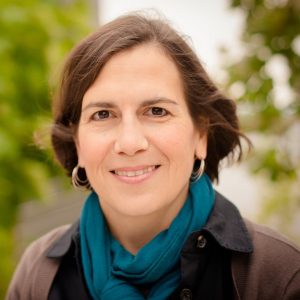
In the midst of all of the challenges we’re facing, it’s important to continue to recognize the dedication of so many excellent instructors on Tech’s campus. That’s why Janet Callahan, dean of the College of Engineering, has selected our ninth Deans’ Teaching Showcase member: Jennifer Becker, an associate professor in the Civil and Environmental Engineering (CEE) Department.
Becker is known by her students for her passion for hands-on learning. As an example, she seeks to create interactive learning environments for her students. CEE1001 is taught only once a year and serves all civil engineering students as well as students in other majors interested in sustainability topics. Rather than teaching a giant section of the course, which may easily exceed enrollments of 90 students, she offers two sections of the course to increase instructor-student interactions. Throughout her class, Becker employs active learning techniques to better enable her students to learn the material. This work extends beyond her own students; last spring, she received the Behind the Scenes Award for helping enterprise groups with their project.
Becker also shines at the graduate level. Many programs assume graduate students will gain the knowledge they need to be successful in their research through real-time mentoring by their advisor, making lab courses rare. She does a service for all of the environmental engineering faculty by including a wet lab component in her wastewater course to provide hands-on experience on which students can build on when they begin their research. Becker also incorporates common industry and computer tools in her classes such as Biowin, a software used to model biological, physical and chemical processes in a plant.
CEE chair Audra Morse emphasizes this connection to industry, saying “In her CEE 4502 Wastewater Treatment Principles & Design course, Jennifer offers multiple field trip sessions to the local wastewater treatment facility to make sure all class members have the opportunity to participate in this real-world learning opportunity. The field trip supports the hands-on learning and software tools Jennifer incorporates in her class. The field trip hits home how the chemical, physical, and biological processes work together in a treatment plant to achieve our design objectives. More importantly, the field trip underscores the size and complexity of the things we build.”
In these and many other ways, it’s clear that Becker’s efforts to be accessible to students are extraordinary. She makes time in the evening to offer review sessions before exams to ensure students have possible opportunities to work out misconceptions and clear up confusion before the exam. Additionally, Becker holds her office hours in the CEE Student Success Center (SSC). Surveys of students have indicated they value the group sessions that occur naturally in this space.
One of Becker’s students echoes this, saying “Becker’s dedication to her students’ learning is just one quality that raises the bar for professors everywhere. Her willingness to help students succeed extends beyond the classroom, where she responds to emails promptly and accommodates students’ needs by taking time out of her busy schedule to help them, even at odd hours, until they feel confident with the material. Becker also aids students by letting them know exactly what is expected from them and holds them to a high standard, which demonstrates true concern for her students’ education.”
Dean Callahan summarizes Becker’s contributions well, saying “It is inspiring to see faculty such as Becker who are so highly engaged with their students. Her hard work is a great help of her students’ learning, both undergraduate and graduate students alike.”
Becker will be recognized at an end-of-term event with other showcase members, and is also a candidate for the CTL Instructional Award Series (to be determined this summer) recognizing introductory or large-class teaching, innovative or outside the classroom teaching methods, or work in curriculum and assessment.
